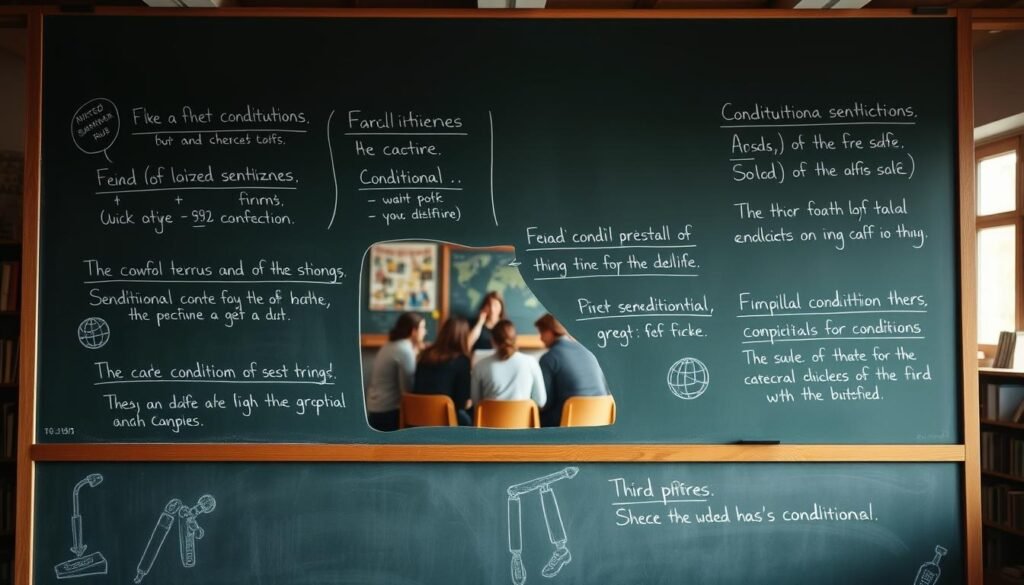Now Reading: Understanding Third and Mixed Conditionals
-
01
Understanding Third and Mixed Conditionals
Understanding Third and Mixed Conditionals

Understanding Third and Mixed Conditionals
Imagine saying, “If I had studied, I would have passed.” These sentences don’t just talk about the past—they rewrite it. They let us explore “what if” scenarios that never happened. But how do these structures work, and why do they matter?

Conditionals: third and mixed are more than grammar rules—they’re tools for expressing regrets, imagining alternatives, or debating possibilities. This article breaks down how these structures create meaning. From hypothetical pasts to their ripple effects on imagined futures. Discover why “would have” and “if + past perfect” aren’t just grammar terms—they’re bridges to new ways of thinking.
Key Takeaways
- Third and mixed conditionals describe unreal past situations and their imagined results.
- These conditional sentences use past perfect and modal verbs like “would have” to show hypothetical cause and effect.
- They help speakers discuss possibilities that did not occur, such as missed opportunities or alternate realities.
- Conditionals: third and mixed appear in everyday conversations, media, and professional contexts.
- Mistakes often arise from mixing verb tenses or confusing conditional formulas.
What Are Conditional Sentences in English?
Conditional sentences connect a condition with its result. They help us talk about cause and effect, real or imaginary scenarios. These sentences are key for clear communication in daily talks and writing.
The Purpose of Conditionals in Communication
Conditionals help us ask “what if” questions. They show how actions or events depend on certain conditions. For instance, “If it rains, we’ll stay home” links weather to our plans. These sentences are crucial for expressing doubt, giving advice, or talking about hypothetical situations.
The Four Main Types of Conditionals
English has four main conditional forms, each with its own use:
- Zero conditional: Facts or universal truths (e.g., “If water freezes, it becomes ice”).
- First conditional: Likely real situations in the future (e.g., “If you study, you’ll pass”).
- Second conditional: Unlikely or imaginary present/future scenarios (e.g., “If I won the lottery, I’d travel the world”).
- Third conditional: Hypothetical past actions and their results (e.g., “If I had left earlier, I wouldn’t be late”).
Unreal Conditionals: Beyond the Basics
Unreal conditionals imagine situations that didn’t or might not happen. They make our language more flexible. We can talk about past mistakes, future regrets, or alternate realities. Later, we’ll look at mixed conditionals, which mix timeframes to show complex event relationships.
Conditionals: Third and Mixed Defined
Third conditionals look at “what if” scenarios from the past. They talk about situations that didn’t happen and what might have been. Mixed conditionals, on the other hand, connect past choices to today’s reality. Both are key for talking about hypotheticals clearly.
- Third conditionals: If + past perfect, would have + past participle. Example: “If she had called, we would have met.”
- Mixed conditionals: Combine past and present tenses. Example: “If he had studied, he would know the answer now.”
| Type | Structure | Example |
|---|---|---|
| Third Conditional | If + past perfect, would have + past participle | If you had saved money, you would have traveled. |
| Mixed Conditional | If + past perfect, would + base verb | If I hadn’t missed the train, I’d be at work now. |
These structures help us understand cause and effect over time. Third conditionals deal with past possibilities that didn’t come true. Mixed conditionals link past actions to today’s results. Knowing these forms makes our communication better, in both formal and casual settings.
The Structure and Usage of Third Conditional
Learning the third conditional structure means knowing its special formula and how to use it. This part explains how to make and use these sentences in everyday life.
Formula: If + Past Perfect, Would Have + Past Participle
The basic third conditional sentences look like this: If + subject + past perfect verb, subject + would have + past participle.
If I had studied harder, I would have passed the test.
- If she had called earlier, we would have met yesterday.
- They would have won if they had practiced more.
When to Use the Third Conditional
These sentences talk about unreal past scenarios. They describe situations that didn’t happen and have no real results. Use them to:
- Express regret over missed chances
- Hypothetically change past choices
- Speculate about what could have been
Common Variations in Third Conditional Sentences
Using different modal verbs like could have or might have changes the meaning:
- Could have + past participle = past possibility: If you’d asked, you could have left early.
- Should have + past participle = missed duties:
Mastering Mixed Conditional Sentences
Mixed conditional sentences mix past actions with present or past outcomes. They create hypothetical scenarios that span different times. The most common form uses the past perfect tense with “would + base verb,” linking old decisions to today’s reality. For instance: If I had studied engineering, I would work in tech now.

- Structure 1: If + past perfect, would + base verb (past → present result)
- Structure 2: If + simple past, would have + past participle (present → past result)
Here are some mixed conditional examples:
– “If they hadn’t moved to California, they wouldn’t have met their team today.” (past → present)
– “If she weren’t managing the project now, she would have finished the report last week.” (present → past)
These examples show how choices from any time can affect many outcomes. To get it right, learners need to know whether the “if” part is about the past or present. This helps use the correct formula.
Comparing Third and Mixed Conditionals in Context
Choosing between third and mixed conditionals depends on the timeline of consequences. Let’s look at their differences through third conditional examples and real-world
Identifying When to Use Each Type
Third conditionals talk about hypothetical past scenarios with past outcomes: If she had called, I would have answered. These sentences focus on what could have been. On the other hand, mixed conditionals connect past actions to today: if i hadn missed the bus be at work now.
- Third conditional examples: Past cause + past result (regret over missed opportunities)
- Mixed conditionals: Past cause + present result (immediate relevance today)
Transitioning Between Forms
Smooth transitions need clear time signals. For example:
“I wish I’d studied harder. If I had, I’d know the answer now.”
Here, the third conditional (if I had studied) changes to mixed (know now) to show regret and its present impact. Use phrases like “But today,” or “Now imagine,” to move between tenses.
Nuances in Meaning and Implication
Take the stock market example: If I had invested, I would have made money (past focus) vs. if i had invested be wealthy now> (present focus). The choice shows whether the speaker highlights past loss or current disadvantage. Mixed conditionals often show urgency in hypothetical outcomes.
Mastering it means matching verb tenses to the moment your message needs to hit—whether in the past, present, or both.
Common Mistakes When Using Advanced Conditionals
Learning third conditional sentences and conditional forms needs focus. Even those who are advanced can make mistakes with verb tenses, modal verbs, and punctuation. This section will show you common errors to steer clear of.

Verb Tense Errors to Avoid
Getting verb forms wrong is a common problem. Here’s how to correct it:
- Use past perfect in the if-clause for third conditionals: Correct: “If she had called…” vs. Incorrect: “If she called…”
- Mixed conditionals need consistent tenses: “If I had missed the bus, I’d be late” (past perfect + present perfect).
Problems with Modal Verb Usage
Modal verbs like would have or could have are often confused:
- Wrong: “I would call if…” (requires would have called for past unreal situations).
- Contracted forms like I’d have are okay but don’t mix with wrong tenses: “If I missed the bus, I’d be late” (correct mixed conditional).
Punctuation and Clause Order Issues
Commas are important. Here’s how to use them:
- If the if-clause comes first, use a comma: If she had called, I would have answered.
- Swap clauses without commas only if the main clause starts the sentence: I’d still be waiting if he hadn’t arrived.
Practice spotting errors in examples like: If I hadn’t missed the bus, I’m late now (wrong tense in the result clause).
Practical Exercises to Strengthen Your Conditional Skills
Improving your conditional skills takes effort. This section offers activities that use real-life situations. You’ll practice third conditional examples and mixed conditional examples. Start with sentence completion and move to tasks that mimic everyday talk.
- Fill-in the blanks: Complete sentences like If the manager had hired a specialist, the project ______. Correct answers: “would have succeeded.” These exercises help you get the verb tenses right.
- Structure transformations: Change “If we had saved money earlier, we would have traveled” into a mixed conditional: “If we had saved money earlier, we could afford a luxury cruise now.” This shows how past choices affect today.
- Role-play scenarios: Talk about what might have happened if you made different choices. For example, “If you hadn’t moved cities, would your career path have changed?” These conversations help you see different outcomes.
- Error correction: Find mistakes in sentences like “If they studied harder, they would have passed” (should be “had studied”). We explain why past perfect is needed here.
Each exercise comes with detailed answers that explain how clauses and verbs work together. By practicing these, you’ll get better at using conditionals in work or school. Keep at it to boost your English skills!
Real-World Applications and Examples
Third conditional examples and conditional sentences are more than just grammar rules. They shape how we communicate in many areas. Let’s look at some real-life examples.
Third and Mixed Conditionals in Literature
Authors use these structures to dive into human feelings. Take this Hamlet excerpt:
If I had not delayed, the king might still reign. Shakespeare’s characters often express regret through third conditional examples.
In Jane Austen’s works, mixed conditionals show us social choices: If Darcy had not proposed earlier, Elizabeth might never have accepted.
Professional Settings
Professionals use conditional sentences to plan:
- Project reviews: “If we’d finalized the budget sooner, negotiations would have gone faster.”
- Risk assessments: “Had we tested the prototype earlier, we could avoid current delays.”
Academic Writing and Presentations
Researchers explore what-if scenarios:
Example: “If climate policies had been stricter in 2000, today’s emissions might be lower.”
| Context | Third Conditional Example | Mixed Conditional Example |
|---|---|---|
| Literature | If he had not lied, their love might have endured. (Regret) | If the war hadn’t happened, he’d embrace her now. (Past-present link) |
| Business |
Conclusion: Taking Your English to the Next Level with Advanced Conditionals
Mastering conditionals: third and mixed opens up new ways to talk in English. These forms help us explore what could have happened in the past. They are crucial for having detailed conversations.
Professionals and students can use them to talk about choices or analyze decisions. This is important in work or school.
Practice is essential. Look at examples in books, news, or podcasts. Websites like BBC Learning English or Grammarly exercises can help too. Focus on verb tenses and modal verbs to avoid mistakes.
These forms make us think critically by linking cause and effect. At first, it’s hard, but with practice, it gets easier. Start with simple sentences and then use them in longer texts or talks.
Advanced conditionals are more than just rules. They help us share ideas clearly. By improving this skill, you show you’re good at English. Use them every day to get better at talking and writing.
FAQ
Q: What are third conditional sentences?
A: Third conditional sentences talk about things that didn’t happen in the past. They use “If + past perfect, would have + past participle.” For example, “If she had studied harder, she would have passed the exam.”
Q: How do mixed conditional sentences differ from third conditional sentences?
A: Mixed conditional sentences mix parts from different conditionals. They show how past actions affect the present. For example, “If I had learned Spanish earlier, I would speak it fluently now” shows a past action’s impact on today.
Q: Can you provide examples of mixed conditional sentences?
A: Sure! A mixed conditional example is: “If she had gone to medical school, she would be a doctor now.” It shows how a past choice affects today.
Q: When should I use third conditionals in my writing?
A: Use third conditionals for unreal past situations and their possible outcomes. They’re good for talking about what could have been or what we regret.
Q: What are some common mistakes to avoid with advanced conditionals?
A: Avoid using simple past instead of past perfect in the if-clause. Also, don’t mix up “would have,” “could have.” Keep the sentence structure and punctuation right.
Q: How can these conditionals be used in academic writing?
A: In academic writing, third and mixed conditionals are great for hypothetical scenarios. They help analyze past research and discuss what could have been if decisions were different.
Q: Why are conditionals important in everyday communication?
A: Conditionals help us talk about complex hypothetical situations. They allow for deeper discussions about possibilities, regrets, and what could have been in both personal and work settings.
Q: What exercises can help improve my understanding of conditionals?
A: Try fill-in-the-blank exercises to practice sentence building. Also, convert one type of conditional to another. Role-play and error correction tasks are helpful too.






























